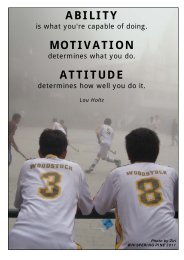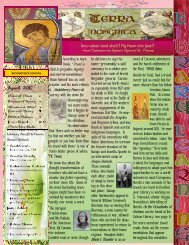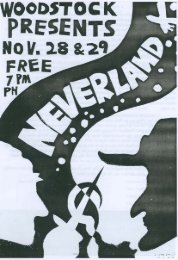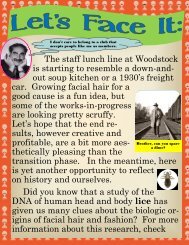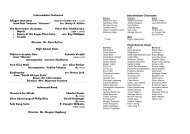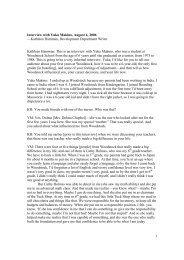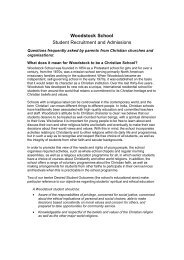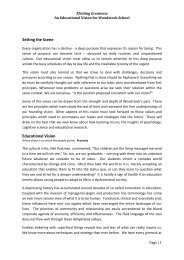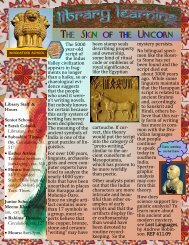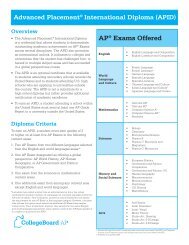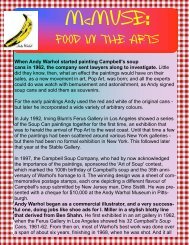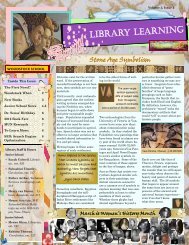Woodstock School Alumni Magazine Vol CIV, 2011
Woodstock School Alumni Magazine Vol CIV, 2011
Woodstock School Alumni Magazine Vol CIV, 2011
Create successful ePaper yourself
Turn your PDF publications into a flip-book with our unique Google optimized e-Paper software.
10 - Quadrangle<br />
Her strategy clearly paid off. One of her<br />
classmates recently told her that she once<br />
felt none of her accomplishments were up<br />
to Quadrangle standards. Now she and her<br />
classmates “are getting comfortable talking<br />
candidly about our successes and our<br />
failures, about some of the really difficult<br />
choices we’ve made in our lives, and how<br />
we’re coping with the outcomes. I’ve drawn<br />
great strength from these honest and very<br />
personal conversations.”<br />
Develop a voice.<br />
Sometimes all it takes is one person to get<br />
things started. One class secretary told me<br />
that he set the ball in motion nearly 20 years<br />
ago. “My class notes were boring. There<br />
was a real sameness about them. At school<br />
what I loved about my classmates was<br />
how bright they were, how much fun they<br />
were to be around. But that wasn’t coming<br />
through in their notes several decades later.”<br />
He sent a message to his classmates suggesting<br />
that people “start opening up and<br />
reflecting on their lives more, as opposed<br />
to filing news of changed demographics<br />
and vital statistics.” With some prompting<br />
they complied. “After a year or two, they<br />
didn’t even need the prompt,” says the<br />
secretary. “The changed tone and content<br />
of the column carried itself, and we feel<br />
far more connected in each other’s lives.”<br />
A class notes column should have a distinctive<br />
voice and a clear sense of audience. For<br />
us, the best columns read like a conversation.<br />
“I try to give the column a real sense<br />
of the contributors’ voices,” says another<br />
contributor. “If someone writes me a letter,<br />
I try and include the news in their voice so<br />
that everyone could get a sense of reading<br />
the same letter I read.”<br />
Be inclusive.<br />
All too often, class notes focus on a single<br />
clique: Each year readers get an update<br />
on the doings of only the class secretary<br />
and his friends, to the exclusion of other<br />
classmates. Some of the most meaningful<br />
jottings come in from those class secretaries<br />
who keep track of both frequent contributors<br />
as well as those that parcel out their<br />
information gradually. Others target certain<br />
classmates or those that live in a different<br />
country - “lost” alumni - with special<br />
notes or an explicit invitation to write.<br />
Attitude is often more important than action.<br />
Saying “we want to hear from every one of<br />
you” and backing it up with a diverse mix<br />
of contributors, can go a long way toward<br />
reaching the silent masses. “If you see a<br />
person in the magazine who doesn’t usually<br />
contribute, it can inspire others to write in,”<br />
says Li Chu. “It really snowballs.”<br />
Ask questions.<br />
You may be surprised what people will tell<br />
you if you ask. Everyone has an opinion,<br />
and most people like to share them. That’s<br />
what class secretary Beth Norford ’80<br />
learned when she decided to solicit book<br />
recommendations from members of her<br />
<strong>Woodstock</strong> class. More than recommendations,<br />
she received critiques, analyses and<br />
meditations on classmates’ recent reading.<br />
“Asking questions opens the door for people<br />
to say more than what jobs they have, what<br />
their children do, or what their husband<br />
does. That narrow focus puts some people<br />
off,” Norford says. “This just gives another<br />
way for people to relate to each other.”<br />
Spurred by a similar idea, Mary Self<br />
Skarsten, ’69 has successfully queried<br />
her classmates on topics like “on turning<br />
50” and “what would be the top 3<br />
things you would like to do if we go<br />
back to Mussoorie”. The initial responses<br />
have generated more responses until it<br />
feels like everyone has something to say.<br />
If you’re worried that asking a question<br />
might preclude the exchange of personal<br />
news, don’t be. These class secretaries have<br />
found that sharing opinions and experiences<br />
related to certain topics seems to elicit more<br />
personal information. Another approach to<br />
soliciting more participation is to start a<br />
dialogue across the years. We are currently<br />
exploring if we could match up members<br />
of this year’s graduating class with some<br />
alumni from the class of 1961, hoping that<br />
the more seasoned class will have some<br />
words of wisdom for students who graduated<br />
50 years later.<br />
Make contributing easy.<br />
Both class secretaries and contributors have<br />
heavy demands on their time. As an alumni<br />
relations team, we should make it as easy as<br />
possible for alumni volunteers to participate.<br />
This year at <strong>Woodstock</strong> we are about to make<br />
a concerted effort to offer class secretaries as<br />
much support as possible. For the Class of<br />
2012, the class secretaries will go through a<br />
formal two-hour training session on campus<br />
shortly after they’re elected in which we tell<br />
them about our deadlines, give them advice<br />
on newsgathering and warn them about the<br />
dangers of using secondhand information. We<br />
also are starting to create a comprehensive and<br />
user-friendly handbook detailing the obligations<br />
of and guidelines for the job. Once these<br />
are ready we are hopeful that we can share<br />
these resources with other class secretaries<br />
around the world, accompanied by a conversation<br />
on Skype. And the commitment is that<br />
as an alumni relations team, we will make<br />
ourselves available via phone, fax, email and<br />
snail mail and respond quickly to questions -<br />
which is just basic customer service.<br />
We encourage class secretaries to find other<br />
efficient ways of soliciting information,<br />
such as creating Facebook pages, starting<br />
an email directory for the class or just making<br />
sure that they are able to attend regional<br />
gatherings near where they live. Please<br />
drop me a note at alumni@woodstock.<br />
ac.in; we would love to publish some of<br />
your ideas in our Letters to the Editor<br />
section in the next issue of the Quadrangle.<br />
Letters to the Editor<br />
Is there something in this issue of Quadrangle that you would like to comment<br />
on? Did one of the stories ring a bell and make you want to share your<br />
experience? There are two ways in which you can respond:<br />
• Email us at alumni@woodstock.ac.in. Letters received will be published online<br />
in the Quad section of the <strong>Woodstock</strong> website, and the most relevant will be<br />
published in the next edition of the Quad in Spring 2013.<br />
• Share Your Story is a new section of the alumni website designed to help you..<br />
share your story. Go to www.woodstockschool.in/share.



